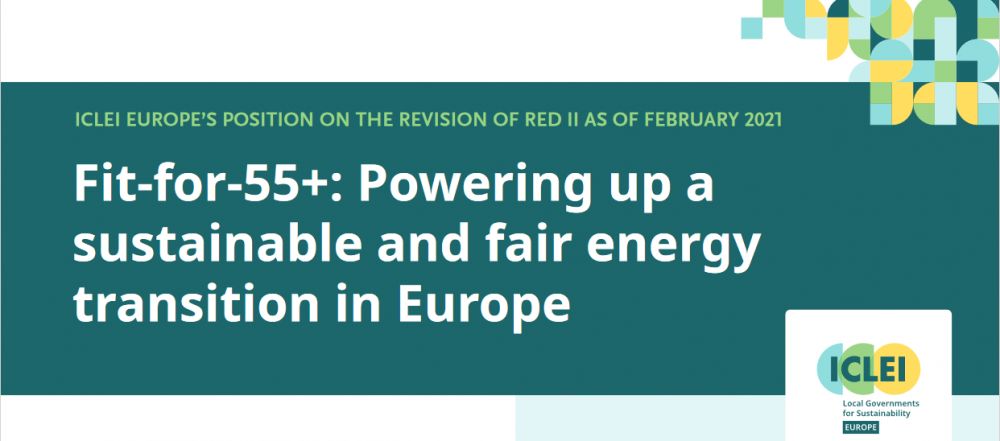COME RES Partner ICLEI publishes position paper on the revision of REDII
01 Mar 21
For successful post-COVID recovery guided by the principles of the EU Green Deal and the objective of Europe to become the first climate neutral continent in 2050, a rapid, fair and broad energy system transition is no longer an option for the EU, but rather the only solution for a sustainable, and more just future for all European citizens.
Europe's Clean Energy Package, adopted in December 2018, included a revised “Renewable Energy Directive” (RED II), which took force in the European Union. In line with the priorities of the Green Deal, and the objective to achieve a climate-neutral Europe by 2050, the Commission will soon table a Fit for 55 package to reduce emissions by at least 55% by 2030. This will cover wide-ranging policy areas – including revising RED II.
Under the title Fit-for-55+: Powering up a sustainable and fair energy transition in Europe, ICLEI Europe published a position on the planed revision of REDII. The network welcomes this revision by the European Commission and sees it as an unprecedented opportunity to solidify and amplify the measures already foreseen, while strengthening the provisions to reach a 38- to 40 percent renewable energy share of gross final energy consumption by 2030.
With local and regional governments (LGs) being not only the level closest to Europeans, but also responsible for implementing 70 percent of all EU legislation, one third of public spending and two thirds of public investment, their capability to support and leverage the full potential of their communities will be crucial to meet EU objectives. Any revised RED II and, in particular, any transposition at the Member State level, must strengthen and continue to facilitate appropriate frameworks, mandates and resources for LGs to implement ambitious actions, by taking to heart four key pillars: leveraging multi-level governance; accelerating implementation on the ground; fostering integrated, cross-sectoral approaches; and increasing support to local and regional governments to speed-up the energy transition.
In sum, ICLEI Europe's position calls for revisions centred around four key principles:
- Leveraging multi-level governance and horizontal integration of policies;
- Shifting focus from defining ambitions to scaling up action on the ground;
- Fostering cross-sectoral approaches by promoting integrated planning and action;
- Raising ambitions by stepping-up support to LGs, including financial and capacity-building support.
The position paper lays out specific recommendations for European legislators, which speak to each of these four pillars. These include recommending the establishment of effective and mandatory multi-level governance platforms for structured and regular consultation that facilitates vertical and horizontal integration of policies and measures; encouraging specific targets for community-owned Renewable Energy Sources (RES) including requirements for the development of co-ownership models in Member States to facilitate community engagement; providing succinct guidelines with clear definitions, targets, monitoring systems and streamlined administrative procedures, adaptable to national contexts, regarding auctioning, tendering, permit schemes and criteria to enhance participation of local governments and consumers in the energy transition; and supporting incentivising models for electricity and thermal energy sharing, and investment in prosumer technologies.
Read the full Position Paper here.
Image (ICLEI Europe)
All news
